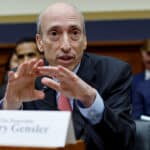The U.S. Securities and Exchange Commission (SEC) on August 10 proposed a rule to improve the quality of disclosures it receives from large hedge funds about their investment strategies and leverage.
The rule, which was proposed in conjunction with the Commodity Futures Trading Commission (CFTC), is part of a broader regulatory effort to increase the transparency of private funds amid worries the industry is a growing source of systemic risk.
The proposal confirmed a Reuters report on Tuesday.
It would expand reporting requirements for advisors and large hedge funds with a net asset value of at least $500 million when filing so-called Form PF with the SEC.
Introduced following the 2007-2009 global financial crisis, Form PF is the primary method used by private funds to disclose confidentially to the SEC purchases and sales of securities.
Growth of private funds
Commissioner Jaime Lizárraga said in a statement that Form PF has brought transparency to a previously opaque yet economically significant sector of financial markets.
“Around the time of the Dodd-Frank Act’s enactment, a common yet unreliable estimate of hedge fund assets under management prior to the 2008 financial crisis was in the neighborhood of $2 trillion,” he said. “Two years after enactment, Form PF filers reported an approximate $8 trillion figure. And, by the fourth quarter of 2021, the gross asset figure reached $20 trillion — an astounding increase over the years.”
Lizárraga added that data also show a significant increase in the exposure to private funds by U.S. individuals, non-profits, and state and municipal government pension plans.
“For example, in the first quarter of 2013, beneficial ownership of all private funds by U.S. individuals was reported at $588 billion. By the fourth quarter of 2021, it was reported at nearly $1.4 trillion,” he said. “This exposure has significant implications for the integrity of our financial markets, particularly for retail investors who invest for their retirement, home ownership, and their children’s education. Which is why today’s proposal to further refine Form PF data collection would be so essential for a more comprehensive evaluation of these implications.”
New requirements
The new rule would require funds to provide more details on their investment strategy and exposure, including borrowing and financing arrangements, open positions and certain large positions. It would also require large hedge funds to report their cryptocurrency exposure, the SEC’s Democratic chair, Gary Gensler, said.
“We’ve tried to take a measured approach, but add to the detail in the context of systemic risk,” he told reporters.
The proposal would also require all private fund advisors — not just advisors to qualifying hedge funds — to report whether the funds provide investors with withdrawal or redemption rights, and if so, how often, Lizárraga said.
The securities regulator – consisting of five voting members including Gensler – voted 3-2 to propose the measure, which is subject to public consultation before it can be adopted.
Sector scrutiny
The proposal follows a January draft rule to improve other Form PF disclosures.
Regulators grew concerned over risk in the private fund industry after hedge fund de-leveraging contributed to turmoil in the U.S. Treasuries market in March 2020. Hedge funds also played a role in last year’s meme stock saga involving GameStop Corp and other companies.
Critics argue that while the sector ballooned following the 2007-2009 financial crisis, regulatory scrutiny of private funds — which are heavy users of borrowed financing — has not kept up.
The International Organization of Securities Commissions, which comprises regulators across the world, said in a January report that some private fund leverage is being hidden from view.
SEC Commissioner Hester Peirce, a Republican, on Wednesday criticized the proposal, saying the information was unnecessary and that private fund investors — insurance companies, endowments, pension funds and high-net-worth individuals — were capable of assessing their own risks.
“Why we need the new information and what we plan to do with it are questions left to the reader’s imagination,” Peirce said in a statement prepared for the open meeting.
She added some of the proposed revisions, such as streamlining the form and reporting process, as well as eliminating redundancies, might be worthwhile.
Industry groups, including the Alternative Investment Management Association and the Managed Funds Association (MFA), said the proposed changes were onerous and could duplicate existing reports.
“The SEC should focus on better utilizing (existing) information rather than imposing new burdens on fund managers,” the MFA’s chief executive, Bryan Corbett, said in a Wednesday statement.
This article was provided by Reuters, with added contributions from Rethinking65.







